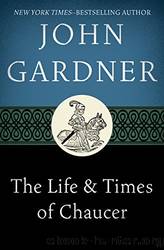The Life & Times of Chaucer by Gardner John

Author:Gardner, John [Gardner, John]
Language: eng
Format: epub
Tags: Classics, poetry, ebook, Biography, History, book
Amazon: B00AG8GVDG
Goodreads: 39936964
Publisher: Open Road Media
Published: 1977-01-01T08:00:00+00:00
My lady yaf me al hooly [gave me wholly]
The noble yifte of hir mercyâ¦
As helpë me God, I was as blyvë [swiftly]
Reysëd, as fro deth to lyvë⦠[raised]
Lady White, in other words, sums up not only all that gives us delight in nature but also the benevolence of the unseen power nature veils. The Book of the Duchess does, of course, far moreâa lyrical and philosophical masterpieceâbut the heart of its greatness is its convincing expression of Gauntâs love and grief, and Chaucerâs anguish and concern.
Not too surprisingly, Gauntâs campaign in France went badly. Even if heâd been at his best, there was little he could do. Under the brilliant du Guesclin the French fought methodically, with infuriating patienceâkeeping out of sight, refusing battle except when they knew they had the clear advantageâas the Scots had done forty years ago, during Edward IIIâs first campaign. Gauntâs army had no choice but vain ravaging marches, hunger and pestilence moving along with them, snatching at the stragglers. The duke was back in England from November 1369 to June 1370, consulting with his father and the Black Prince.
It must have been a painful meeting. It was the first the two brothers had seen of each other since the death of Blanche, and the Black Prince was much worse now, his once powerful body wasted to a skeleton. Yet they were kingâs sons; they got down to business quickly. What was wrong was clear enough. Whatever a manâs courage and will to fight, he canât kill shadows and empty air, an invisible enemy like du Guesclin. But not even the Black Prince was sure, at first, what to do against the Frenchmanâs strategy. In September, sick of body and mind, furious at the warâs dragging on and on, more allies abandoning the English every month, the Black Princeâover Gauntâs strong protestâturned on Limoges the tactics heâd despised when heâd seen King Pedro of Spain use them, and for him as for Pedro, they backfired. Former neutrals and indifferent peasants became fanatical Anglophobes. The Black Prince, feverish and raging, sailed home.
Englandâs depression, and no doubt Chaucerâs, deepened. In plague-gutted France and England, it was beginning to be remarked, chivalry was dead. Gunpowder was standard, and no longer used merely to frighten the horses. As defense against the longbow, breastplates and leg armor of leather were being added to chain mail, with the result that a knight was virtually helpless when down off his horse, hence easy to capture orâby the increasingly popular strategy of King Pedroâkill. Though there were still noble gentlemen of the kind that had rushed to their death at Crécyâstill men like Richard Stury and Guichard dâAngleâthey were becoming increasingly inferior, in general, to the seasoned and able, thoroughly unchivalric mercenary companies who would fight on any side, in any cause, whatever its morality, for cash. The ânew English gentleryâ was on its way, men whose code was that of the crusaders who would shame Christendom in the European campaign of the
Download
This site does not store any files on its server. We only index and link to content provided by other sites. Please contact the content providers to delete copyright contents if any and email us, we'll remove relevant links or contents immediately.
| Actors & Entertainers | Artists, Architects & Photographers |
| Authors | Composers & Musicians |
| Dancers | Movie Directors |
| Television Performers | Theatre |
Cecilia; Or, Memoirs of an Heiress — Volume 2 by Fanny Burney(31940)
Cecilia; Or, Memoirs of an Heiress — Volume 3 by Fanny Burney(31928)
Fanny Burney by Claire Harman(26594)
We're Going to Need More Wine by Gabrielle Union(19033)
Plagued by Fire by Paul Hendrickson(17402)
All the Missing Girls by Megan Miranda(15942)
Cat's cradle by Kurt Vonnegut(15331)
Bombshells: Glamour Girls of a Lifetime by Sullivan Steve(14050)
For the Love of Europe by Rick Steves(13891)
Leonardo da Vinci by Walter Isaacson(13315)
4 3 2 1: A Novel by Paul Auster(12370)
The remains of the day by Kazuo Ishiguro(8969)
Adultolescence by Gabbie Hanna(8917)
Note to Self by Connor Franta(7663)
Diary of a Player by Brad Paisley(7558)
Giovanni's Room by James Baldwin(7320)
What Does This Button Do? by Bruce Dickinson(6194)
Ego Is the Enemy by Ryan Holiday(5412)
Born a Crime by Trevor Noah(5371)
